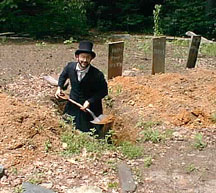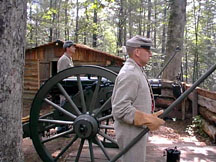My first taste of battle left me largely disoriented, but at least I was still standing at the end,
though I lost my pencil along the way.
Tudd Dean, a member of the Blue Ridge Living History Society and one of the organizers of the Stoneman’s
Raid Civil War re-enactment, recruited me to join the fun. I was to play a civilian reporter during the event
held at the Horn In the West grounds last weekend.
Tudd and another soldier loaned me clothes from the period, a top hat and top coat and cotton shirt and
pants. My only nods to the 21st Century were the rubber soles of my shoes and the rayon in my shoelaces.
My role in the event was as a local reporter in the town where the “battle” was taking place. This year, the
event was staged as a battle centered around Westchester, Virginia. Since that town changed hands more
times than a utility infielder, the script could take many different directions.
When I asked Tudd what I was supposed to do, I learned that there actually was no script. Over a hundred
troops in both blue and gray, more than a dozen horses, a large contingent of civilian women and children,
and one reporter were taking the field with only the vaguest notion of what would happen.
I asked Newland’s Tim Townsend, who was depicting a Sergeant in the Watauga Home Guard, what I
should do. He said I should get out of the way when the action started, to run in the cabin and get captured
along with the women and children.
“I won’t lie to you,” he said. “This is a dangerous hobby.”
That’s when I realized that I was going to be the only unarmed male in the battle, a cowardly reporter who
runs around with a pencil and a piece of paper. This is a role I was born for. Whoever said, “The pen is
mightier than the sword” was probably never in a duel.
Tim and I worked up a little scenario where I would come down during the drill and ask him how the “boys”
were doing, what the state of the war was, and if the Yankees would ever show up here. Warming up, I
tipped my hat to the ladies and engaged in polite conversation, not an unpleasant job by any means. The
Union cavalry rode into town before I had a chance to deliver my lines to the Sergeant, though.

When the firing broke out from replica powder rifles, I gentlemanly assisted the women and children into
one of the cabins. I watched from the safety of the back porch as the Union troops drove back the home
guard.
One of the first Rebel casualties fell about fifteen feet from where I was hiding. He was a television news
cameraman in his day job, and I’d talked with him earlier. I fought down an impulse to go out and help him,
especially as a horse trampled excruciatingly near his head. But that would not have fit my role. No civilian
alive back then, even a reporter, would be dumb enough to run between two battle lines.

The Union soldiers drove back the Boys in Gray, and Yankee foot soldiers stormed the cabin and captured
us. On the front porch, the soldiers began robbing the women and menacing the children. When one got
overly aggressive while taking a cup from a woman, I was driven to defend her honor and have it out with
the blue-belly.





